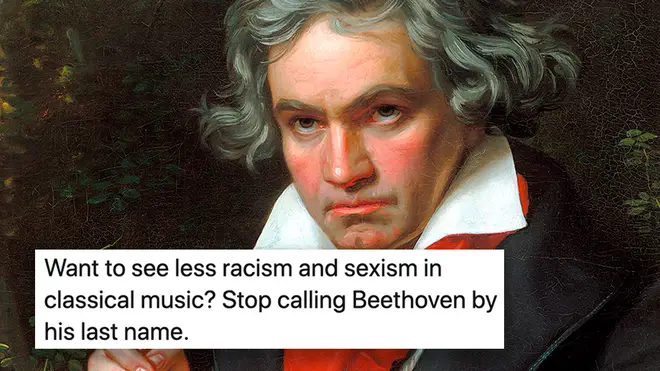‘Fullnaming’ Mozart and Beethoven to fight sexism and racism? Twitter squabbles over Slate article
26 October 2020, 16:28 | Updated: 28 October 2020, 14:25

Twitter is having a meltdown over a Slate article which encourages the “fullnaming” of canonic composers in an effort to end sexism and racism in the classical music industry.
Referring to Mozart and Beethoven by their full names, as we might Florence Price or Scott Joplin, is the “only path to social justice in classical music” – so argues a new piece in US magazine Slate, known for its contrarian views, called Stop Calling Famous Composers by Their Last Names.
The author Chris White, an assistant professor of music theory at the University of Massachusetts Amherst, argues: “When we say, ‘Tonight, you’ll be hearing symphonies by Brahms and Edmond Dédé,’ we’re linguistically treating the former as being on a different plane than the latter, a difference originally created by centuries of systematic prejudice, exclusion, sexism, and racism.”
For information, Dédé was a prominent Creole composer, whose Romantic repertoire found great success in both European and American concert halls.
White concludes that by “fullnaming” all composers, we treat them as equally worthy of attention. “And while fullnaming might seem like a small act in the face of centuries of harm and injustice, by adopting a stance of referential egalitarianism, fullnaming at least does no more harm,” he adds.
“By using everyone’s full names, we can focus more on their music rather than on the past cultural practices that elevated straight white men at the expense of everyone else.”
Read more: Was Beethoven black? Twitter debates German composer’s true heritage >
Want to see less racism and sexism in classical music? Stop calling Beethoven by his last name. https://t.co/x0xP3Er7id
— Slate (@Slate) October 25, 2020
Since it was tweeted out at 1:45am this morning, White’s article has had over 3,000 comments and 1,500 retweets on Twitter.
Some Twitter users took the heckling approach, questioning whether we should all now refer to Mozart using his rather elongated full birth name, Johannes Chrysostomus Wolfgangus Theophilus Mozart. Puccini’s full name, Giacomo Antonio Domenico Michele Secondo Maria Puccini, was also put under the microscope.
"I really enjoyed that last piece by Johannes Chrysostomus Wolfgangus Theophilus Mozart, but that Giacomo Antonio Domenico Michele Secondo Maria Puccini aria was delightful as well!"
— Steven BROO!! Gotcha, Scared you. (@bruleoncool) October 25, 2020
Another asked, tongue-in-cheek, that everyone “stop making fun of Slate”, while others pulled the author up on not giving proper examples of “fullnaming”. White refers in his article to ‘Wolfgang Mozart’ and ‘Ludwig van Beethoven’, but later just ‘Ludwig Beethoven’.
Some argued that was taking the author’s editorial “far too literally”.
Many came to the conclusion that it’s more a question of old versus new, there being a number of famous white men in the 20th and 21st centuries who we still refer to using their full name – the artist Damien Hirst, for instance.
Others, meanwhile, used pop artists to prove their point, citing Madonna, Cher, Beyoncé, Prince and Kanye as non-white and non-male examples of the ‘one-name’ custom.
Read more: Beethoven ‘cancelled’? Why people are debating whether the Fifth Symphony is elitist >
And we shouldn’t call any artist by one name either.
— The Doctor (@TennantRob) October 25, 2020
Kokoschka
O’keefe
Picasso
Miró
Madonna
Kanye
Cher
Frida
Van Gogh
Beyoncé
Eminem
Prince pic.twitter.com/267zkcIT9H
Another thread of discussion under the tweet is around female composers, from Clara Schumann and Fanny Mendelssohn to Alma Mahler.
All three took their husband’s name in marriage, all three were virtuosic musicians and composers in their day – but history has remembered them by their full names, and their more famous husbands by just their surname (equally, you could say the same is true for the lesser-known J.C. Bach, Leopold Mozart and Johann van Beethoven).
It’s also interesting, as one bass player does, to compare classical music’s ‘core’ artists and composers to those in the jazz world. Miles Davis, Ella Fitzgerald and Charlie Parker are, in general, referred to by their full names.
Re: fullnaming/lastnaming in classical music - in jazz, it'd be strange to the point of being disrespectful to refer to "Pastorius, Fitzgerald and Davis."
— licc bass not boots (@its_adamneely) October 25, 2020
That sounds like a law firm, it's "Jaco, Ella and Miles."
Others, however, straight-up agreed with White.
One user received a lot of virtual appreciation for their comment: “It’s amazing how much an article saying ‘Here’s a tiny thing we can do to end the practice of organising classical music as ‘a handful of dead white guys we’ve made into demigods’ and ‘everybody else, for reasons that generally don’t hold up to scrutiny’ offends people.”
It’s not the first time Beethoven has come under the microscope in recent months. In June, a theory on the revolutionary’s true heritage resurfaced and blew up on Twitter. Then followed an episode last month, when the Internet got all fired up over a Vox podcast which asked whether the Fifth Symphony was, in fact, a “symbol of elitism and exclusion”.
We imagine it’s not what LVB thought everyone would be talking about, in his 250th anniversary year...


























